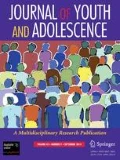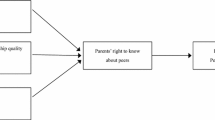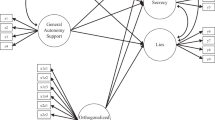Abstract
Little is known regarding how parents’ responses when first learning about their adolescents’ deviant peer affiliation affect adolescents’ further affiliation and disclosure of risk behavior to parents. Studies on the effects of parents’ warnings to control adolescents’ material or personal information resources are particularly scarce. To address these gaps, 237 Jewish Israeli adolescents who self-identified as interacting with deviant peers (40.50% female, mean age = 14.55 years, age range = 13–16 years) reported their mothers’ actual or anticipated responses when learning for the first time about their deviant peer affiliation. The results indicated that mothers’ warnings to control adolescents’ material and information resources were experienced as less frustrating and more satisfying of adolescents’ psychological needs than was mothers’ enactment of resource control. Mothers’ responses of autonomy support and warnings to use resource control were positively associated with cessation of deviant peer affiliation. Mothers’ enactment of resource control was associated with adolescents’ less disclosure and consultation with their mothers regarding risk behaviors, whereas the reverse was true for the general practice of autonomy support. Possible need-related mechanisms underlying the associations of warnings with the cessation of deviant peer affiliation are discussed. The results highlight the importance of parents’ autonomy-supportive response to the onset of deviant peer affiliation as a specific strategy that has benefits beyond the positive effects of the general practice of autonomy support. These findings suggest that it is important to promote an autonomy-supportive response to the onset of deviant peer affiliation also among parents who are generally autonomy-supportive.



Similar content being viewed by others
References
Afifi, A. A., Kotlerman, J. B., Ettner, S. L., & Cowan, M. (2007). Methods for improving regression analysis for Skewed continuous or counted responses. Annual Review of Public Health, 28, 95–111. https://doi.org/10.1146/annurev.publhealth.28.082206.094100.
Assor, A. (2017). The striving to develop an authentic inner compass as a key component of adolescents’ need for autonomy: Parental antecedents and effects on identity, well-being, and resilience. In B. Soenens, M. Vansteenkiste, & S. Van Petegem (Eds.), Autonomy in adolescent development: Toward conceptual clarity (pp. 119–144). London: Psychology Press.
Assor, A., Benita, M., Yitshaki, N., Geifman, Y., & Maree, W. (2020). Sense of authentic inner compass as a moral resource across cultures: Possible implications for resisting negative peer-pressure and for parenting. Journal of Moral Education, 3, 346–364. https://doi.org/10.1080/03057240.2020.1727423.
Assor, A., & Tal, K. (2012). When parents’ affection depends on child’s achievement: Parental conditional positive regard, self-aggrandizement, shame and coping in adolescents. Journal of Adolescence, 35(2), 249–260. https://doi.org/10.1016/j.adolescence.2011.10.004.
Assor, A., Yitshaki, N., & Sher-Censor, E. (2015). Perceived maternal reactions to potential onset of adolescents’ risk-behavior: Paper presented at the 2015 Biennial Meeting of the Society for Research in Child Development (SRCD), Philadelphia, Pennsylvania, USA.
Baumrind, D. (2005). Patterns of parental authority and adolescent autonomy. New Directions for Child and Adolescent Development, 108, 61–69. https://doi.org/10.1002/cd.128.
Chen, B., Vansteenkiste, M., Beyers, W., Boone, L., Deci, E. L., Van der Kaap-Deeder, J., & Ryan, R. M. (2015). Basic psychological need satisfaction, need frustration, and need strength across four cultures. Motivation and Emotion, 39(2), 216–236. https://doi.org/10.1007/s11031-014-9450-1.
Chirkov, V. I. (2009). A cross-cultural analysis of autonomy in education: a self-determination theory perspective. Theory and Research in Education, 7(2), 253–262. https://doi.org/10.1177/1477878509104330.
Currie, C., Molcho, M., Boyce, W., Holstein, B. E., Thorsheim, T., & Richter, M. (2008). Researching health inequalities in adolescence: the development of the HBSC family affluence scale. Social Science & Medicine, 66(6), 1429–1436. https://doi.org/10.1016/j.socscimed.2007.11.024.
Deci, E. L., & Ryan, R. M. (1985). Intrinsic Motivation and Self-determination in Human Behavior. Boston, MA: Plenum Press.
Dishion, T. J., & Patterson, G. R. (2006). The development and ecology of antisocial behavior in children and adolescents. In D. Cicchetti & D. J. Cohen (Eds.), Developmental psychopathology (Vol. 3, 2nd ed., pp. 503–541). Wiley.
Garson, G. D. (2013). Factor analysis (statistical associates blue book series). Asheboro, NC: Statistical Associates Publishers. Asheboro, NC (2008).
Grolnick, W. S. (2003). The psychology of parental control: How well-meant parenting backfires. NY: Lawrence Erlbaum Associates Publishers.
Grolnick, W. S., & Pomerantz, E. M. (2009). Issues and challenges in studying parental control: Toward a new conceptualization. Child Development Perspectives, 3, 165–170. https://doi.org/10.1111/j.1750-8606.2009.00099.x.
Grolnick, W. S., Raftery-Helmer, J. N., Marbell, K. N., Flamm, E. S., Cardemil, E. V., & Sanchez, M. (2014). Parental provision of structure: Implementation and correlates in three domains. Merrill-Palmer Quarterly, 60(3), 355–384. https://doi.org/10.13110/merrpalmquar1982.60.3.0355.
Grolnick, W. S., Ryan, R. M., & Deci, E. L. (1991). Inner resources for school achievement: Motivational mediators of children’s perceptions of their parents. Journal of Educational Psychology, 83(4), 508–517.
Grusec, J. E., Danyliuk, T., Kil, H., & O’Neill, D. (2017). Perspectives on parent discipline and child outcomes. International Journal of Behavioral Development, 41(4), 465–471.
Hawk, S. T., Keijsers, L., Frijns, T., Hale, III, W. W., Branje, S., & Meeus, W. (2013). “I still haven’t found what I’m looking for”: Parental privacy invasion predicts reduced parental knowledge. Developmental Psychology, 49(7), 1286 https://doi.org/10.1037/a0029484.
Hoyle, R. H., & Panter, A. T. (1995). Writing about structural equation models, in R. H. Hoyle (ed.), Structural Equation Modeling, concepts, issues, and applications (pp. 158-176). CA: Sage Publications,
IBM Corp. Released 2015. IBM SPSS Statistics for Windows, Version 23.0. Armonk, NY: IBM Corp.
IBM Corp. Released 2019. IBM SPSS Statistics for Windows, Version 26.0. Armonk, NY: IBM Corp
Kagitcibasi, C. (2007). Family, self, and human development across cultures: Theory and applications. NJ: Lawrence Erlbaum Associates.
Karver, M. S. (2006). Determinants of multiple informant agreement on child and adolescent behavior. Journal of Abnormal Child Psychology, 34(2), 242–253. https://doi.org/10.1007/s10802-005-9015-6.
Katz, I., & Assor, A. (2003). Even if he asks her, she shouldn’t tell: Bedouin children react to stories on autonomy support and suppression. Paper presented at the Biennial Meeting of the Society for Research in Child Development (SRCD), Tampa, FL.
Katz, I., Lemish, D., Cohen, R., & Arden, A. (2019). When parents are inconsistent: parenting style and adolescents’ involvement in cyberbullying. Journal of Adolescence, 74, 1–12.
Keijsers, L., Branje, S., Hawk, S. T., Schwartz, S. J., Frijns, T., Koot, H. M., & Meeus, W. (2012). Forbidden friends as forbidden fruit: Parental supervision of friendships, contact with deviant peers, and adolescent delinquency. Child Development, 83(2), 651–666. https://doi.org/10.1111/j.1467-8624.2011.01701.x.
Keijsers, L., & Laird, R. D. (2014). Mother–adolescent monitoring dynamics and the legitimacy of parental authority. Journal of Adolescence, 37(5), 515–524. https://doi.org/10.1016/j.adolescence.2014.04.001.
Kliewer, W., Sosnowski, D. W., Wilkins, S., Garr, K., Booth, C., McGuire, K., & Wright, A. W. (2018). Do parent-adolescent discrepancies predict deviant peer affiliation and subsequent substance use? Journal of Youth and Adolescence, 47(12), 2596–2607. https://doi.org/10.1007/s10964-018-0879-5.
Lacourse, E., Nagin, D. S., Vitaro, F., Côté, S., Arseneault, L., & Tremblay, R. E. (2006). Prediction of early-onset deviant peer group affiliation: A 12-year longitudinal study. Archives of General Psychiatry, 63(5), 562–568. https://doi.org/10.1001/archpsyc.63.5.562.
Lavee, Y., & Katz, R. (2003). The family in Israel: between tradition and modernity. Marriage & Family Review, 35, 193–217. 10.1300/ J002v35n01_11.
Little, R. J. A. (1988). A test of missing completely at random for multivariate data with missing values. Journal of the American Statistical Association, 83, 1198–1202. http://www.jstor.org/stable/2290157.
Mabbe, E., Soenens, B., Vansteenkiste, M., van der Kaap-Deeder, J., & Mouratidis, A. (2018). Day-to-day variation in autonomy-supportive and psychologically controlling parenting: the role of parents’ daily experiences of need satisfaction and need frustration. Parenting, 18, 86–109. https://doi.org/10.1080/15295192.2018.1444131.
Mageau, G. A., Lessard, J., Carpentier, J., Robichaud, J. M., Joussemet, M., & Koestner, R. (2018). Effectiveness and acceptability beliefs regarding logical consequences and mild punishments. Journal of Applied Developmental Psychology, 54, 12–22.
Maree, W., Yitshaki, N., & Assor, A. (2018). Expected maternal reactions to delinquent peer association as predictors of Bedouin adolescents’ tendencies to avoid risk Behavior. Paper presented at the 2018 Biennial meeting of the Society for Research on Adolescence (SRA), Minneapolis, Minnesota, USA.
McCann, M., Perra, O., McLaughlin, A., McCartan, C., & Higgins, K. (2016). Assessing elements of a family approach to reduce adolescent drinking frequency: Parent–adolescent relationship, knowledge management and keeping secrets. Addiction, 111(5), 843–853. https://doi.org/10.1111/add.13258.
Papini, D. R., Farmer, F. F., Clark, S. M., Micka, J. C., & Barnett, J. K. (1990). Early adolescent age and gender differences in patterns of emotional self-disclosure to parents and friends. Adolescence, 25(100), 959–976. https://search.proquest.com/docview/195925558?accountid=14544.
Papps, F., Walker, M., Trimboli, A., & Trimboli, C. (1995). Parental discipline in Anglo, Greek, Lebanese, and Vietnamese cultures. Journal of Cross-Cultural Psychology, 26(1), 49–64.
Parke, R. D., & Walters, R. H. (1967). Some factors influencing the efficacy of punishment training for inducing response inhibition. Monographs of the Society for Research in Child Development, 32(1), i–45. https://www.jstor.org/stable/1165744.
Pinquart, M. (2017). Associations of parenting dimensions and styles with externalizing problems of children and adolescents: An updated meta-analysis. Developmental Psychology, 53(5), 873–932. https://doi.org/10.1037/dev0000295.
Price, J., Drabick, D. A., & Ridenour, T. A. (2019). Association with deviant peers across adolescence: Subtypes, developmental patterns, and long-term outcomes. Journal of Clinical Child & Adolescent Psychology, 48(2), 238–249. https://doi.org/10.1080/15374416.2017.1405351.
Reitz, E., Deković, M., & Meijer, A. M. (2006). Relations between parenting and externalizing and internalizing problem behaviour in early adolescence: child behaviour as moderator and predictor. Journal of Adolescence, 29, 419–436. https://doi.org/10.1016/j.adolescence.2005.08.003.
Robichaud, J. M., Mageau, G. A., & Soenens, B. (2020). The role of logical consequences in adolescents’ cognitive precursors of compliance and internalization. Journal of Experimental Child Psychology, 192, 104777.
Roth, G., Assor, A., Niemiec, C. P., Ryan, R. M., & Deci, E. L. (2009). The emotional and academic consequences of parental conditional regard: comparing conditional positive regard, conditional negative regard, and autonomy support as parenting practices. Developmental Psychology, 45(4), 1119–1124. https://doi.org/10.1037/a0015272.
Rothenberg, W. A., Lansford, J. E., Bornstein, M. H., Chang, L., Deater‐Deckard, K., Di Giunta, L.,… & Skinner, A. T. (2020). Effects of parental warmth and behavioral control on adolescent externalizing and internalizing trajectories across cultures. Journal of Research on Adolescence. https://doi.org/10.1111/jora.12566.
Rudy, D., Sheldon, K. M., Li, Y., Kamble, S., Bi, X., & Palermo, F. (2015). Who chooses best? Explaining the interactive effect of culture and decision maker on children’s intrinsic motivation. Journal of Cross-Cultural Psychology, 46, 471–488. https://doi.org/10.1177/0022022115572684.
Ryan, R. M., & Deci, E. L. (2017). Self-Determination Theory: Basic Psychological Needs in Motivation, Development, and Wellness. New York, NY: Guilford.
Smetana, J. G. (2017). Current research on parenting styles, dimensions, and beliefs. Current Opinion in Psychology, 15, 19–25. https://doi.org/10.1016/j.copsyc.2017.02.012.
Smetana, J. G., Jambon, M., & Ball, C. (2014). The social domain approach to children’s moral and social judgments. In M. Killen & J. G. Smetana (Eds.), Handbook of moral development (pp. 23–45). NJ: Psychology Press.
Soenens, B., & Vansteenkiste, M. (2010). A theoretical upgrade of the concept of parental psychological control: Proposing new insights on the basis of self-determination theory. Developmental Review, 30(1), 74–99.
Soenens, B., Vansteenkiste, M., & Beyers, W. (2019). Parenting adolescents. In Handbook of parenting: vol. 1: Children and parenting (Vol. 1, pp. 101–167). NY: Routledge.
Tilton-Weaver, L., Kerr, M., Pakalniskeine, V., Tokic, A., Salihovic, S., & Stattin, H. (2010). Open up or close down: How do parental reactions affect youth information management? Journal of Adolescence, 33(2), 333–346. https://doi.org/10.1016/j.adolescence.2009.07.011.
Trudeau, L., Mason, W. A., Randall, G. K., Spoth, R., & Ralston, E. (2012). Effects of parenting and deviant peers on early to mid-adolescent conduct problems. Journal of Abnormal Child Psychology, 40(8), 1249–1264. https://doi.org/10.1007/s10802-012-9648-1.
Van Der Kaap-Deeder, J., Vansteenkiste, M., Soenens, B., & Mabbe, E. (2017). Children’s daily well-being: the role of mothers’, teachers’, and siblings’ autonomy support and psychological control. Developmental Psychology, 53(2), 237–251. https://doi.org/10.1037/dev0000218.
Van Petegem, S., Soenens, B., Vansteenkiste, M., & Beyers, W. (2015). Rebels with a cause? Adolescent defiance from the perspective of reactance theory and self‐determination theory. Child Development, 86(3), 903–918. https://doi.org/10.1111/cdev.12355.
Van Petegem, S., Zimmer-Gembeck, M. J., Soenens, B., Vansteenkiste, M., Brenning, K., Mabbe, E., & Zimmermann, G. (2017). Does general parenting context modify adolescents’ appraisals and coping with a situation of parental regulation? The case of autonomy-supportive parenting. Journal of Child and Family Studies, 26(9), 2623–2639. https://doi.org/10.1007/s10826-017-0758-9.
Wuyts, D., Soenens, B., Vansteenkiste, M., & Van Petegem, S. (2018). The role of observed autonomy support, reciprocity, and need satisfaction in adolescent disclosure about friends. Journal of Adolescence, 65, 141–154. https://doi.org/10.1016/j.adolescence.2018.03.012.
Acknowledgements
We express our sincere gratitude to the adolescents who participated in this research.
Author information
Authors and Affiliations
Contributions
E.S.C. and A.A. conceived of the study, participated in its design and coordination, conducted statistical analyses and drafted the paper. N.Y. participated in data collection and statistical analyses and drafted the paper. All authors read and approved the final paper.
Funding
The authors did not receive support from any organization for the submitted work.
Data Sharing and Declaration
The datasets generated and analyzed during the current study are available in the Open Science Framework repository, doi: 10.17605/OSF.IO/4DNM2
Corresponding author
Ethics declarations
Conflict of Interest
The authors declare that they have no conflict of interest.
Ethical Approval
Study procedure and measures were approved by the Human Research Review Board of the participating universities (#025/12; #1104-12) and the chief scientist of the Ministry of Education (#719). The procedures used in this study adhere to the tenets of the Declaration of Helsinki.
Informed Consent
Active informed consent was obtained from the adolescents and passive informed consent was required from parents. The latter procedure entailed parents’ receipt of a letter from the researchers providing information about the purposes of the study and its method. Parents were asked to complete a form if they did not wish their adolescent child to participate in the study. No parent completed this form.
Additional information
Publisher’s note Springer Nature remains neutral with regard to jurisdictional claims in published maps and institutional affiliations.
Rights and permissions
About this article
Cite this article
Sher-Censor, E., Yitshaki, N. & Assor, A. How Should Mothers React When They First Learn About Their Child’s Involvement With Deviant Peers? The Adolescents’ Perspective. J Youth Adolescence 50, 935–951 (2021). https://doi.org/10.1007/s10964-020-01383-y
Received:
Accepted:
Published:
Issue Date:
DOI: https://doi.org/10.1007/s10964-020-01383-y




